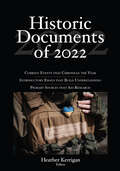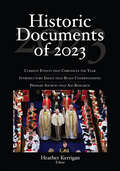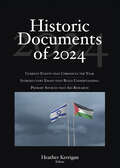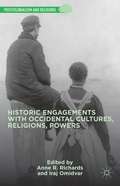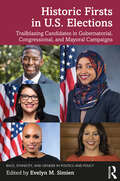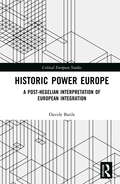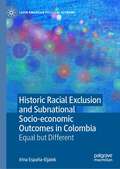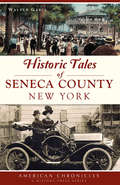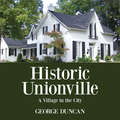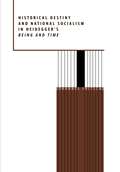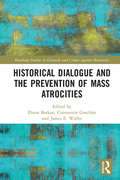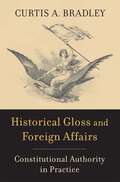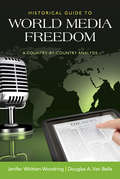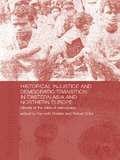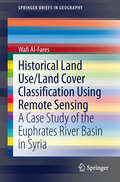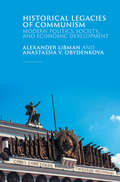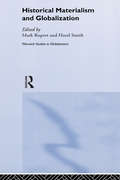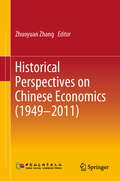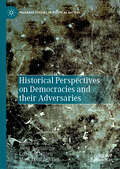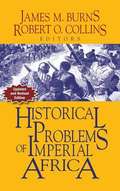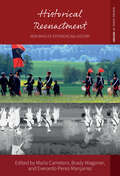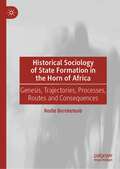- Table View
- List View
Historic Documents of 2022 (Historic Documents)
by Heather KerriganPublished annually since 1972, the Historic Documents series has made primary source research easy by presenting excerpts from documents on the important events of each year for the United States and the World. Each volume pairs 60 to 70 original background narratives with well over 100 documents to chronicle the major events of the year, from official reports and surveys to speeches from leaders and opinion makers, to court cases, legislation, testimony, and much more.
Historic Documents of 2023
by Heather KerriganPublished annually since 1972, the Historic Documents series has made primary source research easy by presenting excerpts from documents on the important events of each year for the United States and the World. Each volume pairs 60 to 70 original background narratives with well over 100 documents to chronicle the major events of the year, from official reports and surveys to speeches from leaders and opinion makers, to court cases, legislation, testimony, and much more. Historic Documents is renowned for the well-written and informative background, history, and context it provides for each document. Organised chronologically, each volume covers the same wide range of topics: business, the economy and labor; energy, environment, science, technology, and transportation; government and politics; health and social services; international affairs; national security and terrorism; and rights and justice. Each volume begins with an insightful essay that sets the year’s events in context, and each document or group of documents is preceded by a comprehensive introduction that provides background information on the event. Full-source citations are provided. Readers have easy access to material through a detailed, thematic table of contents, and each event includes references to related coverage and documents from the last ten editions of the series.
Historic Documents of 2023
by Heather Kerrigan River Horse Communications, LLPPublished annually since 1972, the Historic Documents series has made primary source research easy by presenting excerpts from documents on the important events of each year for the United States and the World. Each volume pairs 60 to 70 original background narratives with well over 100 documents to chronicle the major events of the year, from official reports and surveys to speeches from leaders and opinion makers, to court cases, legislation, testimony, and much more. Historic Documents is renowned for the well-written and informative background, history, and context it provides for each document. Organised chronologically, each volume covers the same wide range of topics: business, the economy and labor; energy, environment, science, technology, and transportation; government and politics; health and social services; international affairs; national security and terrorism; and rights and justice. Each volume begins with an insightful essay that sets the year’s events in context, and each document or group of documents is preceded by a comprehensive introduction that provides background information on the event. Full-source citations are provided. Readers have easy access to material through a detailed, thematic table of contents, and each event includes references to related coverage and documents from the last ten editions of the series.
Historic Documents of 2024 (Historic Documents)
by Heather KerriganPublished annually since 1972, Historic Documents provides an unparalleled collection of primary sources that chronicle the most significant events of each year in the United States and around the world. Each edition features 60 to 70 original background narratives and more than 100 primary source documents—including official reports, speeches, legislation, court decisions, testimony, and more. Known for its exceptional editorial quality, the series offers expertly written context for each document, making primary source research accessible and meaningful. Organized chronologically, the volume covers key developments across a wide range of areas including politics, the economy, labor, international affairs, rights and justice, health, science, environment, and national security. A comprehensive introductory essay situates the year’s events, while full-source citations, a detailed thematic table of contents, and cross-references to the past decade of volumes enhance usability for researchers, educators, and students alike.
Historic Documents of 2024 (Historic Documents)
by Heather KerriganPublished annually since 1972, Historic Documents provides an unparalleled collection of primary sources that chronicle the most significant events of each year in the United States and around the world. Each edition features 60 to 70 original background narratives and more than 100 primary source documents—including official reports, speeches, legislation, court decisions, testimony, and more. Known for its exceptional editorial quality, the series offers expertly written context for each document, making primary source research accessible and meaningful. Organized chronologically, the volume covers key developments across a wide range of areas including politics, the economy, labor, international affairs, rights and justice, health, science, environment, and national security. A comprehensive introductory essay situates the year’s events, while full-source citations, a detailed thematic table of contents, and cross-references to the past decade of volumes enhance usability for researchers, educators, and students alike.
Historic Engagements with Occidental Cultures, Religions, Powers
by Anne R. Richards Iraj OmidvarThis book explores centuries of power relations and imperial and civilizing rhetorics, overarching themes highlighted in these infrequently heard accounts by eastern travelers to the West. Considered in depth are evolutions in mental frameworks and practices that led to the emergence of anticolonial consciousness and strategies of protest.
Historic Firsts in U.S. Elections: Trailblazing Candidates in Gubernatorial, Congressional, and Mayoral Campaigns (Race, Ethnicity, and Gender in Politics and Policy)
by Evelyn M. SimienHistoric Firsts in U.S. Elections:Trailblazing Candidates in Gubernatorial, Congressional, and Mayoral Campaigns examines barrier-breaking figures across various types of elective offices and constituent groups. The moment in which historic firsts enter the electoral arena, and the unique campaigns that ensue, are shown to be symbolically empowering. These change agents on the campaign trail become lighting rods for more liberal policies, and their candidacies are tied to questions of representation, electability, and performance. The distinctive combinations of race, ethnicity, and gender identities represented here translate into voter excitement to go to the polls and participate in other ways. Original chapters by respected scholars and practitioners consider how recent breakthrough elections are similar to yet different from past elections for gubernatorial, congressional, and mayoral offices. The shadow of Donald Trump’s wildly unconventional U.S. presidency looms over this groundbreaking analysis, linking local to national level politics. For students of politics across the curriculum, this book expands the theoretical capacity of intersectionality research and links it to voter mobilization and electoral success.
Historic Power Europe: A Post-Hegelian Interpretation of European Integration (Critical European Studies)
by Davide BarileThis book proposes a new theoretical framework to move beyond the traditional tenets of modern international relations theory to investigate European integration and shed light on current events. Based on contemporary analyses, Hegel’s political philosophy, and the fundamental role of historical interpretation, this book addresses the institutional dynamics as well as the discursive practices behind both the Eastern enlargement and the current critical situation. Looking back in particular at European integration in one of its most significant events, namely the enlargement of the European Union to include former Socialist countries, it offers a unique conceptualisation of the nature and limits of European integration and for understanding the current crisis between Brussels and the Visegrád countries, 30 years since the revolutions of 1989. This book will be of key interest to scholars and students of European integration, European politics and history, and political theory and philosophy.
Historic Racial Exclusion and Subnational Socio-economic Outcomes in Colombia: Equal but Different (Latin American Political Economy)
by Irina España-EljaiekThis book examines the geo-racialized order of the Colombian state and its consequences for Afro-descendant territories. To do so, it employs a historical institutional approach tracing racial exclusion and subnational socioeconomic outcomes in Colombia during the late nineteenth to mid-twentieth centuries. It uses a mixed-methods and interdisciplinary qualitative and quantitative analytical approach to identify the quantitative effects of informal racial exclusion on subnational collective outcomes, as well as to show more precisely how these effects were generated. Through its exploration of Colombia’s geo-racialized project, implicit exclusion of Afro-descendant territories and spatialized nature of racial diversity, this book contributes to literatures of Latin American political economy, institutional theory, racial politics and economic history.
Historic Tales of Seneca County, New York (American Chronicles)
by Walter GableLocated in the Finger Lakes region of New York, Seneca County has a fascinating history. Early settlers courageously fought off wild animals from wolves to panthers to tame the land and keep the new settlements safe. The rise and fall of the mill industry led to the demise of ghost towns like the Kingdom. The jailhouse murder of John Walters in 1887 fostered improved conditions in the county jail. From the first home-run hitter in major-league baseball to the insidious activity of the Ku Klux Klan in the 1920s and the unfortunate burning of a traveling embalmed whale, author and historian Walter Gable shares many of the defining moments of Seneca County history.
Historic Unionville: A Village in the City
by George DuncanA guided tour of historic Unionville, a little Ontario village bursting with historic buildings full of stories. Unionville is a village in the city — an unexpected oasis where time seems to move a little more slowly than in the hectic world of condos, commercial strips, and traffic gridlock. Since the late 1960s, when Unionville and its vintage Main Street were “discovered,” the village has been a magnet for visitors. Historic Unionville is the first detailed exploration of the facts and folklore behind Unionville’s winding ways and eclectic architectural sights, which span two centuries from the Georgian to the Postmodern. Touring the heritage sites that still stand proudly in the community as signposts to the past, George Duncan brings to life stories of the people, places, and events behind this unique and inviting Ontario village.
Historical Destiny and National Socialism in Heidegger's Being and Time
by Johannes FritscheThere has been much debate over the relationship of Heidegger's philosophy—in particular his book Being and Time—to his practical involvement with National Socialism. Yet the question has never been addressed through a comparison of Being and Time with other texts on history and politics written at the time. Johannes Fritsche does this, providing a detailed interpretation of the relevant passages in Being and Time—especially sections 72-77 on fate, community, and society. He analyzes for comparison two other authors who explicitly regarded themselves as rightists—Adolf Hitler (Mein Kampf) and Max Scheler (Formalism in Ethics and other writings)—and two authors on the left—Georg Lukács (History and Class Consciousness) and Paul Tillich (The Socialist Decision).Fritsche concludes that Being and Time is a brilliant summary of right-wing politics in general, which proposes the destruction of liberal society in order to regenerate an idealized community. In addition, Heidegger rejects positions on the right, such as Scheler's, that enabled their authors to distance themselves from the most extreme political rightists, and thus he paves the way for National Socialism. Being and Time, Fritsche demonstrates, must be seen as a clear case for the National Socialists and their project of revitalization of the Volksgemeinschaft, the community of the people.
Historical Dialogue and the Prevention of Mass Atrocities (Routledge Studies in Genocide and Crimes against Humanity)
by Elazar Barkan Constantin Goschler James E. WallerThis book brings together a diverse range of international voices from academia, policymaking and civil society to address the failure to connect historical dialogue with atrocity prevention discourse and provide insight into how conflict histories and historical memory act as dynamic forces, actively facilitating or deterring current and future conflict. Established on a variety of international case studies combining theoretical and practical points of view, the book envisions an integrated understanding of how historical dialogue can inform policy, education, and the practice of atrocity prevention. In doing so, it provides a vital basis for the development of preventive policies sensitive to the importance of conflict histories and for further academic study on the topic. It will be of interest to all scholars and students of history, psychology, peace studies, international relations and political science.
Historical Gloss and Foreign Affairs: Constitutional Authority in Practice
by Curtis A. BradleyA new interpretation of the constitutional law of foreign affairs, as it has been developed throughout its history by presidents and by Congress.In the more than 230 years since the Constitution took effect, the constitutional law governing the conduct of foreign affairs has evolved significantly. But that evolution did not come through formal amendments or Supreme Court rulings. Rather, the law has been defined by the practices of Congress and the executive branch, also known as “historical gloss.”Curtis A. Bradley documents this process in action. He shows that expansions in presidential power over foreign affairs have often been justified by reference to historical gloss, but that Congress has not merely stepped aside. Belying conventional accounts of the “imperial presidency” in foreign affairs, Congress has also benefited from gloss, claiming powers for itself in the international arena not clearly addressed in the constitutional text and disrupting claims of exclusive presidential authority.Historical Gloss and Foreign Affairs proposes a constitutional theory that can make sense of these legal changes. In contrast, originalist theories of constitutional interpretation often ignore influential post-Founding developments, while nonoriginalist theories tend to focus on judicial decisions rather than the actions and reasoning of Congress and the executive branch. Moreover, the constitutional theories that do focus on practice have typically emphasized changes at particular moments in time. What we see in the constitutional law of foreign affairs, however, is the long-term accumulation of nonjudicial precedents that is characteristic of historical gloss. With gloss confirmed as a prime mover in the development of foreign affairs law, we can begin to recognize its broader status as an important and longstanding form of constitutional reasoning.
Historical Guide to World Media Freedom: A Country-by-Country Analysis
by Douglas A. Van Belle Jenifer Whitten-WoodringScholars of international relations and international communications view the extent of media freedom from country to country as a key comparative indicator either by itself or in correlation with other indices of national political and economic development. This indicator serves as a bellwether for gauging the health and spread of democracy. Historical Guide to World Media Freedom brings together comprehensive historical data on media freedom since World War II, providing consistent and comparable measures of media freedom in all independent countries for the years 1948 to the present. The work also includes country-by country summaries, analyses of historical and regional trends in media freedom, and extensive reliability analyses of media freedom measures. The book’s detailed information helps researchers connect historical measures of media freedom to Freedom House’s annual Freedom of the Press survey release, enabling them to extend their studies back before the 1980s when Freedom House began compiling global press freedom measures. Key Features: A-to-Z, country-by-country summaries of the ebb and flow of media freedom are paired with national media freedom measures over time. Introductory chapters discuss such topics as the theoretical premises behind the nature and importance of media freedom, historical trends, and the challenges of coding for media freedom in a way that ensures consistency for comparison. Concluding material covers the historical patterns in media freedom, how media freedom tracks with other cross-national indicators, and more. Accessible to students and scholars alike, this groundbreaking reference is essential to collections in political science, international studies, and journalism and communications.
Historical Injustice and Democratic Transition in Eastern Asia and Northern Europe: Ghosts at the Table of Democracy
by Robert Cribb Kenneth ChristieThe memory of past atrocity lingers like a ghost at the table of democracy. Injustices carried out in the past - from massacres and murder to repression and detention - embitter societies and distort their structures so that the process of establishing and running a democracy carries an extra burden. This volume examines societies at various stages of dealing with the memory of the past, from China, Mongolia, Indonesia and the Baltic States, where bitter memories of death and persecution still intrude, to Finland, where the civil war of 1918 has finally been accepted as a distant national tragedy.
Historical Land Use/Land Cover Classification Using Remote Sensing: A Case Study of the Euphrates River Basin in Syria
by Wafi Al-FaresAlthough the development of remote sensing techniques focuses greatly on construction of new sensors with higher spatial and spectral resolution, it is advisable to also use data of older sensors (especially, the LANDSAT-mission) when the historical mapping of land use/land cover and monitoring of their dynamics are needed. Using data from LANDSAT missions as well as from Terra (ASTER) Sensors, the authors shows in his book maps of historical land cover changes with a focus on agricultural irrigation projects. The kernel of this study was whether, how and to what extent applying the various remotely sensed data that were used here, would be an effective approach to classify the historical and current land use/land cover, to monitor the dynamics of land use/land cover during the last four decades, to map the development of the irrigation areas, and to classify the major strategic winter- and summer-irrigated agricultural crops in the study area of the Euphrates River Basin.
Historical Legacies of Communism in Russia and Eastern Europe
by Stephen Kotkin Mark R. BeissingerThis book takes stock of arguments about the historical legacies of communism that have become common within the study of Russia and East Europe more than two decades after communism's demise and elaborates an empirical approach to the study of historical legacies revolving around relationships and mechanisms rather than correlation and outward similarities. Eleven essays by a distinguished group of scholars assess whether post-communist developments in specific areas continue to be shaped by the experience of communism or, alternatively, by fundamental divergences produced before or after communism. Chapters deal with the variable impact of the communist experience on post-communist societies in such areas as regime trajectories and democratic political values; patterns of regional and sectoral economic development; property ownership within the energy sector; the functioning of the executive branch of government, the police, and courts; the relationship of religion to the state; government language policies; and informal relationships and practices.
Historical Legacies of Communism: Modern Politics, Society, and Economic Development
by Alexander Libman Anastassia V. ObydenkovaLibman and Obydenkova reveal how legacies of the Communist Party of the Soviet Union (CPSU) have survived in the politics, economic development, culture, and society of post-Communist regions in the 21st Century. The authors show how this impact is not driven by Communist ideology but by the clientelistic practices, opportunism and cynicism prevalent in the CPSU. Their study is built on a novel dataset of the CPSU membership rates in Russian regions in the 1950s-1980s, alongside case studies, interviews and an analysis of mass media previously only available in Russian and discussed here in English for the first time. It will appeal to students and scholars of Russian and Eastern European politics and history, and anyone who wants to better understand countries which live or have lived through Communism: from Eastern Europe to China and East Asian Communist states.
Historical Materialism and Globalisation: Essays on Continuity and Change (Routledge Studies in Globalisation)
by Hazel Smith Mark RupertNow that Soviet style socialism has collapsed upon itself and liberal capitalism offers itself as the natural, necessary and absolute condition of human social life on a worldwide scale, this book insists that the potentially emancipatory resources of a renewed, and perhaps reconstructed, historical materialism are more relevant in today's world than ever before. Rather than viewing global capitalism as an eluctable natural force, these essays seek to show how a dialectic of power and resistance is at work in the contemporary global political economy, producing and contesting new realities and creating conditions in which new forms of collective self determination become thinkable and materially possible. It will be vital, topical reading for anyone interested in international relations, international political economy, sociology and political theory.
Historical Perspectives on Chinese Economics (1949–2011)
by Zhuoyuan ZhangThe book summarizes the 60 year development of economic theories, explaining in detail the features and development of economic theories from 1949 to 1976 and in the reform and opening-up period. The author has made a systematic theoretical analysis on the economic situation from two different stages — before and after China's reform and opening-up, which put forward many unconventional point of view, and it has contributed visionary ideas for the research on China's economy. It provide the readers with a general understanding of the economic trend and development of contemporary China, with many pertinent answer to the practical and concrete problems about China's economy.
Historical Perspectives on Democracies and their Adversaries (Palgrave Studies in Political History)
by Joost Augusteijn Constant Hijzen Mark Leon de VriesThis book historicizes the debate over how democratic regimes deal with anti-democratic groupings in society. Democracies across the world increasingly find themselves under threat from enemies, ranging from terrorists to parties and movements that undermine democratic institutions from within. This compilation of essays provides the first historical exploration of how democracies have dealt with such anti-democratic forces in their midst and how this impacted upon what democracy meant to all involved. From its inception in the nineteenth century, modern democratic politics has included fundamental debates over whether it is undemocratic and dangerous to ban parties with anti-democratic objectives and whether democracies should defend themselves, if necessary with violence, against perceived anti-democratic forces. This volume shows that implicit conceptions of democracy and democratic repertoires become explicit, fluid, and contested throughout these confrontations, not only within democratic parties, but also among their adversaries. Both sides have, at times, used force or limited the expression of ideas, thus blurring the lines between who is democratic and who is not.
Historical Problems Of Imperial Africa
by Robert O. Collins James M. BurnsThis book is designed to inform, engage, and stimulate discussions among its readers. Collins and his collaborators have included authoritative statements and analysis by renowned scholars. A distinctive characteristic of the whole anthology is the range of interpretations of classic and recent research. The book offers a full spectrum of emotionally charged theories. Each section presents a set of conflicting arguments to show the state of debates on these highly controversial issues. Extensive commentary by the editors leads the reader through this treasury of theories and dramatically highlights the development of the field.
Historical Reenactment: New Ways of Experiencing History (Making Sense of History #44)
by Mario Carretero, Brady Wagoner, and Everardo Perez-ManjarrezLong dismissed as the domain of hobbyists and obsessives, historical reenactment—the dramatization of past events using costumed actors and historical props—has only in recent years attracted serious attention from scholars. Drawing on examples from around the world, Historical Reenactment offers a fascinating, interdisciplinary exploration of this cultural phenomenon. With particular attention to reenactment’s social and pedagogical dimensions, it develops a robust definition of what the practice constitutes, considers what methodological approaches are most appropriate, and places it alongside museums and memorial sites as an object of analysis.
Historical Sociology of State Formation in the Horn of Africa: Genesis, Trajectories, Processes, Routes and Consequences
by Redie BereketeabThis book analyses the historical sociology of state formation in the Horn of Africa. It examines the genesis, trajectories, processes, routes and consequences of the evolution of state formation. Three analytical and explanatory models explain the process of state formation in the HOA: proto-state, colonial and national liberation. The models, heuristically and innovatively, provide understanding, interpretation and analysis of state formation. While the proto-state model explicates an indigenous historical process of state formation, the colonial model refers to an externally designed and imposed process of state formation. The national liberation model concern state formation conducted under liberation movement and ideology. The distinct significance of these models is that collectively they generate sufficient analysis of state formation. They are also unique in that they have never been employed as aggregate analytical and explicative instruments to address the predicament of state formation in the Horn of Africa.
